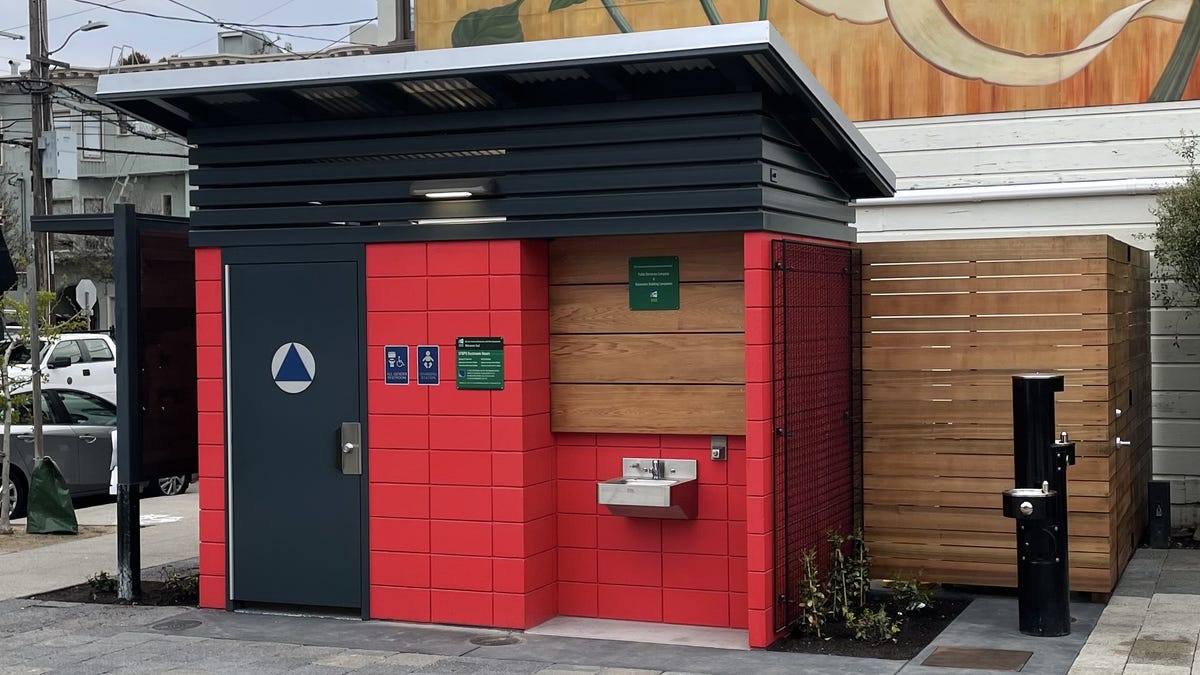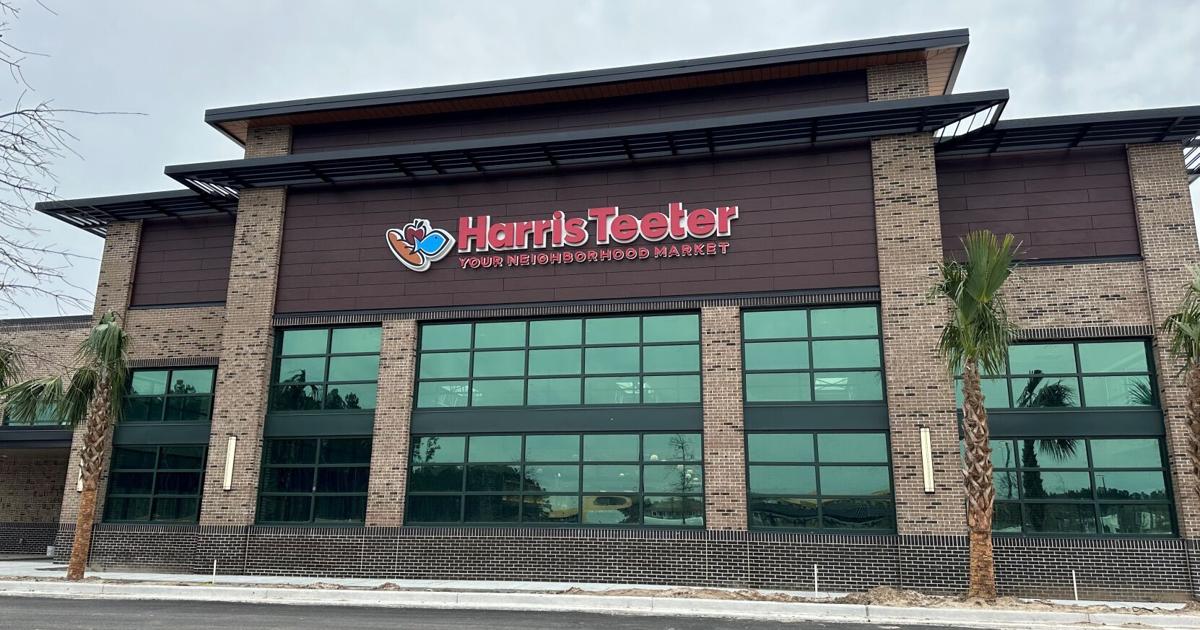San Francisco, CA
Once estimated to cost $1.7 million, San Francisco’s long-mocked toilet is up and running

A San Francisco restroom once estimated to cost $1.7 million is now up and running for the public after the city received criticism, jokes and a generous donation.
San Francisco Recreation and Parks opened the single public restroom in the Noe Valley neighborhood after receiving a donation that cut the city’s cost to under $200,000, Daniel Montes, the city agency’s communication manager, told USA TODAY in an email.
“The bathroom has been well received by the Noe Valley community, and we’re happy to finally provide some relief for parkgoers,” Montes said.
Public Restroom Company’s and Volumetric Building Companies’ donations equate to a combined $425,000 and include a prefabricated modular restroom and all associated installation work, the city agency said in a January 2023 news release. Public Restroom Company, a Nevada-based business, also donated a toilet previously used for demonstration purposes in trade shows.
“The gift also allows Rec and Park to save approximately $491,000 in design, construction management and other regulatory and design review costs,” according to the release.
San Francisco Rec and Park criticized for $1.7 million restroom
Before the donation, the city received criticism from community members who thought the restroom would be paid entirely by state funding, San Francisco Rec and Park said in the release. The initial “rough estimate” for the custom-designed and custom-built restroom at Noe Valley Town Square was $1.7 million with a two-year timeline, according to the city agency.
The donation will save the city $115,500 on construction, $91,800 in project management fees and $90,000 in architecture and engineering fees, San Francisco Rec and Park said.
“We are thrilled to accept this generous donation, which will allow us to deliver this important project to the Noe Valley community,” Phil Ginsburg, general manager of San Francisco Rec and Park, said in the release. “… It’s not easy navigating the city’s contracting and construction process, which of course is of small consolation when your 2-year-old needs a diaper change. We will fully support efforts by our city’s leaders to make small public works projects like this one − which aren’t always saved by philanthropy − less costly and more efficient to deliver.”
Bill Maher, San Francisco residents find humor in the installation of $1.7 million restroom
Although the city received a donation to cover some expenses, the public and celebrities still made jokes about a restroom estimated to cost $1.7 million.
Comedian Bill Maher spoke about the bathroom in February 2023 on his talk show “Real Time with Bill Maher,” which he reposted on Facebook. He called San Francisco the “poop capital of the world” and said the problem he has with the government is that it does not disclose other expenses needed for projects which “sucks the money out of America.”
One commenter under Maher’s clip on Facebook joked about cashing out on the new restroom.
“Imma gonna use it, slip and fall, and sue the city for $14 million,” the commenter said.
San Francisco residents even found the idea of a $1.7 million toilet humorous when they held the “Toilet Bowl” on Sunday to commemorate the bathroom’s installation.
“We wanted to, you know, really roll with it,” Zach D’Angelo, dressed as a giant roll of toilet paper with a red plunger as his hat, told the New York Times at the event. D’Angelo stepped away from hosting trivia at a pub down the street to be the event’s emcee, or what he called “the Grand Poobah,” the outlet reported.
“I am flush with excitement!” D’Angelo told the outlet, before he began telling toilet jokes his 7-year-old nephew came up with.

San Francisco, CA
San Francisco Giants Rotation Faces Key Decision This Weekend

The San Francisco Giants will cram four games into three days at home against the Colorado Rockies, thanks to a doubleheader on Saturday.
With that, the Giants face a decision at the back end of that four-game series, according to reporting from NBC Sports Bay Area.
The first three starters are set, but Sunday’s game will likely be “Jordan Hicks’ last start or Alex Cobb’s first,” per the outlet.
Cobb is nearly ready to return from his injury rehab and after a strong start to the season while Hicks has trailed off in terms of performance, putting manager Bob Melvin in a bit of a spot.
Hicks has been a reliever most of his Major League career, but when the Giants signed him in the offseason they said they would convert him into a starter, something he wanted.
The early returns were promising.
He went 2-0 in his first six starts and kept his ERA under 2.00. Cobb and Robbie Ray started the season on the injured list. Blake Snell hit the IL after the season’s first three weeks. So Hicks’ performance was a great lift.
But the quality of those starts has gradually dropped. He went 2-2 with a 3.99 ERA in May, followed by an 0-2 June in which he had an ERA of 5.24. His three starts in July have been terrible — an 0-3 record and a 8.31 ERA.
NBC Sports Bay Area reported that the Giants would give Hicks one more start before a discussion about his role. But his last start on Tuesday — in which he gave up four earned runs and was unable to get out of the fourth inning — may have given them cause to reconsider.
Whether Hicks starts on Sunday may depend entirely upon Cobb’s readiness.
San Francisco had hoped Cobb would return earlier than this. He had offseason hip surgery and was expected to miss a portion of the regular season. But while doing rehab work for the hip he felt mild shoulder irritation before throwing a bullpen session on April 16. That landed him on the 60-day injured list four days later and took him out of the mix until at least late May.
He wasn’t ready to make a rehab start until June 30.
In his last rehab start this past weekend he was sharp, tossing five innings and not allowing a run. More importantly, he threw 60 pitches.
A return to the rotation would give the Giants another veteran arm as they try to stay in the playoff race and allow them to move Hicks to the bullpen.
As for the rest of the series, the Giants will start Kyle Harrison on Friday, followed by Blake Snell in Game 1 of Saturday’s doubleheader and rookie Hayden Birdsong in Game 2.
San Francisco, CA
San Francisco slashes homeless outreach team budget

In March, the most recent month of immediately available data, HEART responded to 1,303 incidents, or 98% of calls the team received. But of those incidents, 700 were considered settled because the person was “gone on arrival,” and 125 were referred to the police, the Department of Public Works, the Emergency Medical Services Agency or another street team run by the city.
According to the March data, HEART placed one person in a shelter, referred four to an emergency shelter and placed two in a triage center. The team also resolved 210 American Disability Act violations, meaning encampments were moved to make space for pedestrians.
In a statement, the Department of Emergency Management and Department of Homelessness and Supportive Housing said HEART completed more than 1,000 needs assessments and connected over 700 people to “benefits including shelter” with a team of 24 people.
San Francisco, CA
Down and Out in San Francisco

Image by Joshua Earle.
For many residents of the United States, especially those in its cities and larger suburbs, the fact of homelessness is quite well established. Camps made up of lean-tos, tents, small fire pits and people exist in parks, woods, along city streets and under freeway bridges around the nation. The reaction to these settlements by residents with houses and local authorities ranges from acceptance and providing services to the unhoused to vigilante and police attacks on the encampments. Despite the differences in these responses, both represent an acceptance of an essential fact: most people living outside because they can’t afford to live inside do so because of the capitalist economy.
Those who support the vigilantes and the police attacks on the unhoused are, in essence, rejecting the humanity of those being attacked and “swept” up (to use a popular euphemism). Whether they acknowledge this truth or not, their actions reveal an understanding that only people with houses matter when all is said and done. Meanwhile, those who work through churches, social services and other organizations that assist the unhoused prove a certain belief that modern capitalism is irredeemable. 
J. Malcolm Garcia worked in an organization helping the unhoused during the 1990s. The agency was in San Francisco. I lived in the San Francisco Bay Area from the late 1970s until the mid-1980s. Of the seven or eight years I lived there, I spent a few of them on the streets. Even then, there were several hundred, if not thousands, of unhoused folks making do, keeping away from the cops, hitting the free meals and sleeping where they could. By 1984—after almost four years of neoliberal Reaganomics—those numbers had increased dramatically. So had a certain sense of desperation as funding was taken away from government agencies and non-profits that served the poor—housed and unhoused. I was lucky. I got out. Some of my friends did not.
Since his work in the social services world of San Francisco, Mr. Garcia has gone on to become one of the world’s most unique and honest journalists. His articles focus on those whose lives have been disrupted, even overturned, by US capitalism and its wars. Several collections of his work have been published and received plaudits and awards. This summer, Seven Stories published his first novel, titled Out of the Rain.
Like his journalism, this novel is about people. Based on his experiences as a social worker in an agency that worked with those without houses, Garcia tells his story with a collection of profiles. From the chronic and amiable alcoholic Walter to the tragic life of a crack addict named Varneeta, the author weaves a profound tale of humanity. Lives that most of his readers can only imagine, if even that, are chronicled in bits and pieces. People in recovery struggling with the urge to go to the liquor store instead of work; men fighting off urges to take advantage of vulnerable women they interact with at the shelter and men that give in to those urges; recovering alcoholics and drug users living lives of loneliness because their previous friends are still using and are nothing but a temptation. Informing it all is the primary protagonist Tom who directs the shelter and center that serves as the focal point for the novel’s characters. His job is one that requires compassion, but demands a certain ruthlessness. That ruthlessness is most often related to the other primary informant of the tale: a national and local economy that cuts funding for services to the poor in favor of profits for the rich. For anyone who has been to San Francisco since Reagan took over the country they must certainly agree that it is the rich who matter the most there.
This is a very human story. It is also very honest. Despite the occasionally unbearable misfortunes that happen to different characters at points in the narrative, a certain hopeful spirit remains the novel’s essence. At the novel’s end, Tom has moved on from his role at the shelter and center to a new job helping refugees. His burnout from caring too much while wrestling with politicians and funders who don’t really like the grimness and squalor of lives lived in the street has won out. This novel is his reminder to the reader as to why we need to care.
-

 World1 week ago
World1 week agoOne dead after car crashes into restaurant in Paris
-

 Midwest1 week ago
Midwest1 week agoMichigan rep posts video response to Stephen Colbert's joke about his RNC speech: 'Touché'
-

 News1 week ago
News1 week agoVideo: Young Republicans on Why Their Party Isn’t Reaching Gen Z (And What They Can Do About It)
-

 Movie Reviews1 week ago
Movie Reviews1 week agoMovie Review: A new generation drives into the storm in rousing ‘Twisters’
-

 News1 week ago
News1 week agoIn Milwaukee, Black Voters Struggle to Find a Home With Either Party
-

 Politics1 week ago
Politics1 week agoFox News Politics: The Call is Coming from Inside the House
-

 News1 week ago
News1 week agoVideo: J.D. Vance Accepts Vice-Presidential Nomination
-

 World1 week ago
World1 week agoTrump to take RNC stage for first speech since assassination attempt



















